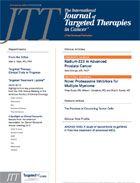Two Potential Biomarkers for Detecting Response to Epigenetic Drugs in MDS Identified
Two DNA demethylation biomarkers could potentially be used to more accurately determine response to epigenetic drugs for myelodysplastic syndromes.
Based on these findings, it may be possible to develop a simple urine test to track response to epigenetic drugs for MDS, suggested lead author Xiaojing Yang, PhD, a postdoctoral fellow at the University of Southern California, Los Angeles.
Azacitidine and decitabine are approved DNA demethylation agents for MDS, and these agents are under study for the treatment for other cancers. “It is important to develop a demethylation marker to monitor patients taking these drugs,” Yang said. Currently, physicians often cannot tell if a patient is really getting the epigenetic drug, making it difficult to decide to stop treatment or increase the dose of the drug, he said. However, previous efforts to find a biomarker have not held up and were not correlated with clinical outcome. “Changes in demethylation status over time make it challenging to identify a biomarker,” Yang said.
The researchers used the Infinium DNA methylation platform to identify improved markers of DNA demethylation status. The profile, consisting of 27,000 genomic regions, was tested on normal and tumor bladder tissue samples and on white blood cells from healthy donors. The researchers found 1429 regions that were consistently methylated in all three samples.
Giuseppe Giaccone, MD, PhD
The next step was to test the methylation profile of the 1429 regions in T24 bladder cancer and HL60 leukemia cell lines treated with a DNA methyltransferase inhibitor for 24 hours. Of these, significant response to demethylation treatment was observed in 79 regions, and these regions remained demethylated beyond 30 days. Subsequent analysis focused on the top two regions, which showed consistent hypermethylation in normal and tumor samples.
Yang and associates verified their findings by studying the DNA demethylation levels of the two biomarkersTH and DNA12—in urine samples from 7 MDS patients treated with azacitidine. Both markers were significantly demethylated, while LINE-1 methylation exhibited no clear trend for decreasing.
“This is a complex abstract,” said Giuseppe Giaccone, MD, PhD, Georgetown University Lombardi Comprehensive Cancer Center in Washington, DC, who moderated the AACR press conference on the study. “The identification of potential biomarkers in substances like blood and urine is important. The data are promising. They show that LINE-1 is not a good marker, but these investigators have identified two new markers that seem to pan out so far in a small group of patients. The findings will take on more importance when demethylating agents are applied to solid tumors. Biomarkers would help us understand how the treatments work and whether they are effective,” he said.

Survivorship Care Promotes Evidence-Based Approaches for Quality of Life and Beyond
March 21st 2025Frank J. Penedo, PhD, explains the challenges of survivorship care for patients with cancer and how he implements programs to support patients’ emotional, physical, and practical needs.
Read More